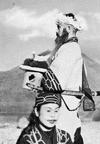- Ainu
-
1. a member of an aboriginal population of northernmost Japan, having lighter skin and hairier bodies than other Japanese.2. the language of the Ainus.
* * *
Indigenous people of what is now Japan.Pushed north by the Japanese people over the last 2,000 years, the few remaining pure Ainu today live principally in northern Hokkaido, Sakhalin, and the Kuril Islands. Once physically and culturally distinct from the Japanese, their origins and their role in Japanese history and prehistory have been the subject of scholarly debate. Many contemporary Ainu claim some connection to the prehistoric Jōmon culture. The Ainu language, which has no known relationship to any other language, is virtually extinct, being supplanted by Japanese. The Ainu were traditionally hunters, fishermen, and trappers; their religion centred on spirits believed to be present in animals and the natural world. Ainu couple in ceremonial dress, Hokkaido, Japan.Courtesy of the Consulate General of Japan, New York City
Ainu couple in ceremonial dress, Hokkaido, Japan.Courtesy of the Consulate General of Japan, New York City* * *
▪ peopleindigenous people of Hokkaido, Sakhalin (Sakhalin Island), and the Kuril Islands who were culturally and physically distinct from their Japanese neighbours until the second part of the 20th century. The Ainu may be descendants of an indigenous population once widely spread over northern Asia; many contemporary Ainu claim some connection to Japan's prehistoric Jōmon culture. The traditional Ainu language, an isolate with a number of dialects, had been almost completely supplanted by Japanese (Japanese language) by the early 21st century; a language-revitalization movement initiated formal instruction in Ainu in the 1980s.The Ainu once lived on all four major Japanese islands. Their traditional dress included bark cloth, often decorated with geometric designs. Although the Ainu were predominantly a hunting and gathering culture, some members also engaged in shifting agriculture, a method in which fields are used for a few seasons and then abandoned so as not to exhaust the soil. animism was the traditional religion. The most important ritual took place over several years and involved the capture of a bear cub that was then raised as a member of the family; at a designated time, the bear was ritually (ritual) killed. Having treated the bear well in life, the Ainu believed that in death its spirit would ensure the well-being of its adoptive community.The Japanese began colonizing Ainu territory in the 1st millennium AD. Over the centuries, and despite armed resistance, these indigenous peoples lost most of their traditional lands; eventually they were resettled in the northernmost reaches of the Japanese archipelago. There they were seen as an essentially captive market and as a buffer against potential invasions by the Russians to the north.Japanese control of Ainu territory tightened after the Meiji Restoration (1868). During this period, Japanese racial (race) discourse about the Ainu—which had long belittled the latter—became increasingly pejorative. Japanese observers had noted that the Ainu were hirsute in comparison with themselves, a fact emphasized by traditional Ainu customs in which men wore heavy beards and women had facial tattoos that at first glance appeared to be mustaches. Other physical distinctions included the absence of an epicanthal fold and a tendency to have lighter skin and hair colour than other East Asians. For a variety of reasons, late 19th-century Japanese pseudoscience fixated on Ainu hairiness and postulated many preposterous notions for its cause, claiming, for instance, that the Ainu interbred with animals in order to produce hirsute children. These notions, which supported the derogatory appellation “hairy Ainu,” provided rationalizations for forced assimilation and the perpetuation of discrimination.Throughout the 20th century, large numbers of ethnic Japanese settled on Hokkaido and intermarried with the Ainu. Although most Ainu rituals are no longer enacted in a strictly traditional manner, they continue to be celebrated through events at museums and festivals. At the end of the 20th century, Ainu activism and cultural revitalization movements (revitalization movement) became increasingly effective; activist Kayano Shigeru was elected to the Japanese Diet (parliament) in 1994, the first Ainu to achieve that distinction, and a number of legal reforms protecting Ainu culture were passed in following years. In 2008 Japan officially recognized the Ainu as an indigenous people, reversing an 1899 action that had declared them “former Aborigines.”Some 25,000 persons of Ainu descent lived on Hokkaido in the early 21st century.* * *
Universalium. 2010.
